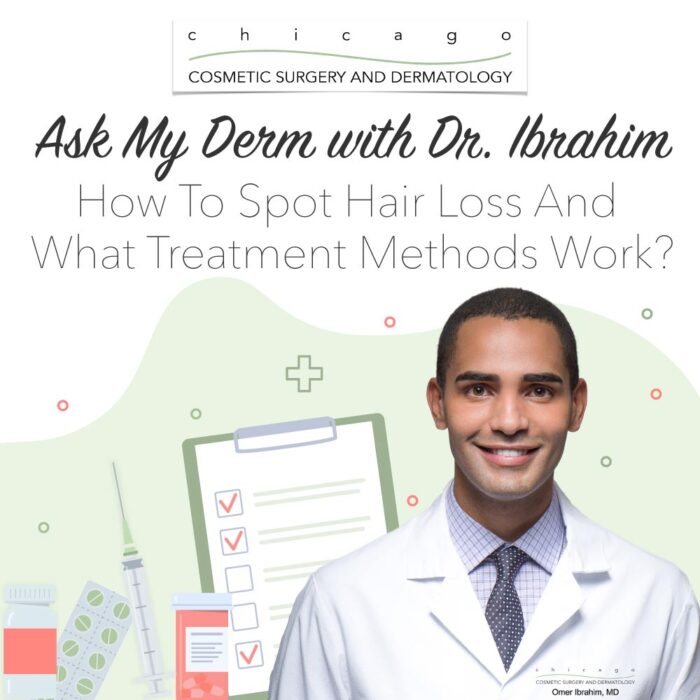Ever wondered what signs you’re supposed to look for if you think you’re experiencing hair loss or what treatments are available if you are experiencing hair loss? We asked our very own hair loss expert, Omer Ibrahim, MD, FACS, to give us the scoop!
Q: How would people know if they’re experiencing a normal amount of hair shedding versus actual hair loss that requires treatment?
Dr. Ibrahim: If you notice more hair in the shower, in the sink, on the pillow, on your clothes, on their desks, or in your food even – and have never noticed it before – this likely means you have increased shedding. Most cases of shedding will resolve within 3-4 months and return to normal. However, lots of patients can cycle into chronic shedding (greater than 3 months), and those patients should come in to seek treatment. Another subset of patients don’t even notice shedding, but notice gradual thinning of the hair overtime and see more of their scalps than they used to see years ago. These patients, if bothered by the thinning, should seek treatment sooner than later. The quicker hair loss is treated, the easier it is to prevent further shedding and response to treatment will be more robust.
Q: What are the most common causes of hair loss you see in your clinic for women? For men?
Dr. Ibrahim: In patients (men and women) with just generalized thinning, the most common cause is of course, genetics and hormones. A very complex interaction between the two leads to hair thinning over time. In women, this can worsen and accelerate once they reach menopause. In men, taking testosterone supplementation will accelerate hair thinning. In patients with increased acute shedding (telogen effluvium), the most common cause is an emotional or psychological stressor 3-6 months prior; these can include anything from starting a new job and moving to a new city, to the loss of a loved one.
Q: At what point is it most ideal to prevent or reverse hair loss? Is it ever too late?
Dr. Ibrahim: In the majority of cases, it is never too late. The sooner the better (within the first 5 years), but of course all my patients get full treatment because it never hurts to try. It is too late once the hair follicles are completely inactive, and this is seen mainly in men that have completely lost the hair follicles and have a shiny scalp. However, as mentioned, the vast majority of patients can stand to benefit from a hair loss treatment of some sort.
Q: What treatments for hair loss do you perform/prescribe the most to your patients?
Dr. Ibrahim: There are an array of options available:
• Some sort of vitamin supplement like Viviscal Pro or Nutrafol – for men and women (which one we choose depends on the patient, the goal, and what we are treating).
• Minoxidil – either topical or oral – one of the oldest, gold standard treatments that works time and time again
• Finasteride in men
• Spironolactone in younger women. Dutasteride in older women with other medical conditions we need to be conscious of.
• PRP (Platelet-Rich Plasma) injections – an in-office procedure where the growth factors in plasma are harvested and injected back into the scalp – in order to normalize shedding, and regrow and thicken hair. It is used in conjunction with the aforementioned at-home medical treatments.
To help all of our patients battle hair loss, we are offering a FREE 1-month supply of Viviscal Professional when you buy a 3-month supply ($60 value) until 8/31/20 or while supplies last! Call or text our office (312-245-9965 option 2) to schedule your hair loss consultation and get a treatment plan customized just for you!


